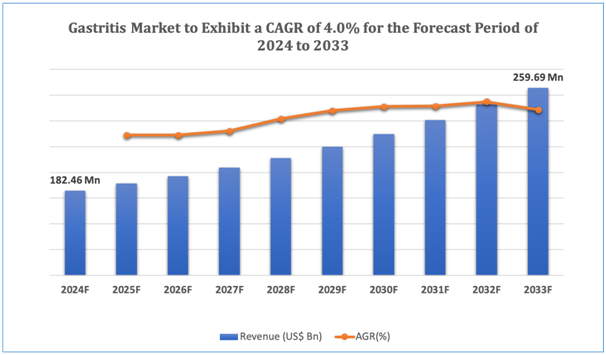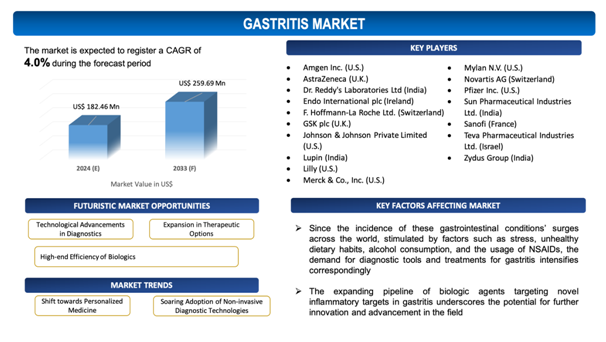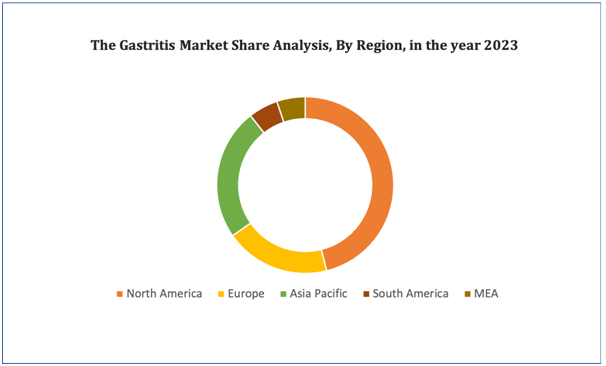Gastritis Market Overview
The global Gastritis market is estimated to be worth over USD 259.69 Mn in 2033 and is expected to grow at CAGR of4.0% during the forecast period (2024-2033).
Gastritis can be perceived as a prevalent digestive diseasedefined by inflammation of the stomach lining, oftentimes resulting in symptoms such as nausea, abdominal pain, bloating, vomiting, and loss of appetite. It can be induced by different factors, comprising infection with Helicobacter pylori bacteria, excessive alcohol consumption, extendedusage of nonsteroidal anti-inflammatory drugs (NSAIDs), smoking, stress, and autoimmune disorders. The global market for gastritis management encompasses a range of diagnostic and treatment alternativescustomized to address the underlying causes and symptoms of the condition. Diagnostic modalities comprisebiopsy,endoscopic examination, blood tests to determine H. pylori infection, and imaging studies. Treatment strategies emphasize on mitigating symptoms, eliminating H. pylori infection (if present), minimizing stomach acid production, and facilitating stomach lining healing.
Medications such as proton pump inhibitors (PPIs), H2-receptor antagonists, antacids, and antibiotics are commonly prescribed, along with lifestyle modifications such as stress management, dietary changes, and cessation of alcohol and tobacco use. The global gastritis market is fueled by numerous factors, involving the increased prevalence of gastritis across the world, owing to factors such as unhealthy dietary habits, growing alcohol consumption, increasing prevalence of H. pylori infection, and widespread use of NSAIDs. In addition to that, the soaring awareness about digestive health and the availability of advanced diagnostic tools contribute to market growth by supporting early detection and appropriate management of gastritis. In parallel, continuous research and development efforts focused at developing novel therapeutic approaches and improving diagnostic accuracy are expected to drive market expansion in the forthcoming years. However, challenges such as the escalated cost of advanced diagnostic procedures and medications, along with limited access to healthcare in some regions, are likely tohamper market growth to some extent. Nonetheless, initiatives aimed at improving healthcare infrastructure and growing awareness about gastritis and its management present opportunities for market players to expand their product offerings and address unmet medical needs in this field.
Figure 1. Gastritis: Market Size

Get more details on this report - Request Free Sample
Key Market Insights &Current Market Landscape:
The global gastritis market is marked by a disparatescale of diagnostic and treatment alternativesfocused at addressing the underlying causes and symptoms of the condition. Major market insights reflect a substantial prevalence of gastritis across the world, fueled by factors such as unhealthy dietary habits, growing alcohol consumption, Helicobacter pylori infection, and the widespread use of nonsteroidal anti-inflammatory drugs (NSAIDs). The current market panorama comprises various diagnostic modalities, involving biopsy, blood tests for H. pylori detection, endoscopic examination, and imaging studies, facilitating accurate diagnosis and treatment planning. Treatment strategies focus on symptom relief, eradication of H. pylori infection, decline of stomach acid production, and promotion of stomach lining healing, with medications such as proton pump inhibitors (PPIs), H2-receptor antagonists, antacids, and antibiotics commonly prescribed. In addition to that, lifestyle modifications play a crucial role in managing gastritis, including dietary changes, stress management, and cessation of alcohol and tobacco usage.
Significant developments in the gastritis market comprise the advent of novel therapeutic approaches and advanced diagnostic technologies. Emerging treatments targeting H. pylori infection, such as combination antibiotic therapies and novel antimicrobial agents, provide promising alternative for more effective eradication. Along with that, advancements in endoscopic techniques, including high-definition imaging and minimally invasive procedures, improve diagnostic accuracy and patient comfort. The union of artificial intelligence (AI) and machine learning algorithms into diagnostic platforms holds potential for enhancing diagnostic efficiency and guiding personalized treatment decisions. In addition, the development of non-invasive diagnostic tests, such as breath tests and stool antigen tests, provides alternatives to invasive procedures, expanding accessibility and convenience for patients. Overall, the global gastritis market continues to evolve with innovations aimed at enhancing diagnostic capabilities, treatment efficiency, and patient outcomes, spurred by continuous research and development efforts and growing awareness of digestive health.
Market Dynamics
Market Drivers
Increased Gastrointestinal Disorders
Escalated gastrointestinal disorders presents as a substantial market driver for the global gastritis market owing to their direct correlation with the prevalence of gastritis. Gastrointestinal disorders such as gastroesophageal reflux disease (GERD), Helicobacter pylori infection, inflammatory bowel disease (IBD), and peptic ulcersoften coexist or predispose individuals to gastritis. According per the records of the Centers for Disease Control and Prevention (CDC), it is estimated that about 1-1.3 million people are suffering from Inflammatory Bowel Disease (IBD) in U.S. Incidence of Crohn’s disease and ulcerative colitis is 201 per 100,000 adults and 238 per 100,000 adults, respectively, thus propelling the market growth.Since the incidence of these gastrointestinal conditions’surgesacross the world, stimulated by factors such as stress, unhealthy dietary habits, alcohol consumption, and the usage of NSAIDs, the demand for diagnostic tools and treatments for gastritis intensifies correspondingly. Healthcare providers prioritize the diagnosis and management of gastritis as part of comprehensive gastrointestinal care, fueling market growth. Along with that, the interaction between different gastrointestinal disorders underscores the prominence of accurate diagnosis and tailored treatment strategies for effective disease management. Thus, the soaring prevalence of gastrointestinal diseasesplays the role of a leading market driver, stimulating innovation and investment in the global gastritis market to meet the growing demand for diagnostic and therapeutic solutions.
Market Restraints
With regard to numerous advantages of Gastritis, the market faces several challenges due to the unique characteristics and requirements associated with them. Some of the key market challenges include:
- Medication Side Effects and Risks:
- Commonly prescribed medications for gastritis, such as proton pump inhibitors (PPIs) and NSAIDs, can have side effects and long-term risks, includinggreater risk of gastrointestinal infections, fractures, and kidney disease.
- Concerns about these adverse effects are likely to lead to hesitancy among patients and healthcare providers in prescribing or adhering to treatment regimens, thushindering market growth and adoption of pharmaceutical interventions.
- Limited Efficacy of Standard Treatments:
- Despite the availability of various treatment alternatives, comprising medications and lifestyle modifications, some incidence of gastritis are likely toshowcase limited response to standard therapies.
- Treatment-resistant gastritis presents a challenge for healthcare providers, requiring alternative approaches and potentially leading to prolonged symptom management, increased healthcare utilization, and patient dissatisfaction, thus restraining market growth.
Market Opportunities
Rising Geriatric Population
The high-grade efficiency of biologics presents a substantial market opportunity for the global gastritis market. Biologics, comprising monoclonal antibodies and other protein-based therapeutics, provide a targeted and accurate approach to treating gastritis, specifically in cases refractory to traditional treatments. These biologic agents particularly target key inflammatory pathways involved in gastritis, such as immune cell activationand cytokines, which may lead to enhanced efficacy and symptom control. In addition to that, biologics have shown favourable results in mitigating inflammation and promoting tissue healing in chronic gastritis, comprising cases associated with autoimmune diseases. As a result, there is soaring interest among healthcare providers and patients in exploring biologic therapies as alternative or adjunctive treatments for gastritis, fueling market demand.
In parallel, the expanding pipeline of biologic agents targeting novel inflammatory targets in gastritis underscores the potential for further innovation and advancement in the field. Clinical trials investigating the efficacy and safety of biologics in gastritis continue to appear, providing opportunities for market expansion and differentiation. In addition, the growing prevalence of gastritis, along with the increasing demand for personalized and targeted therapies, positions biologics as a promising avenue for tackling unmet medical needs in the management of gastritis, thusspurring market growth and investment in this space.
Market Trends
- Shift towards Personalized Medicine:
- There is a soaring trend towards personalized medicine in the management of gastritis, fuelled by advancements in diagnostic techniques and a greater understanding of disease mechanisms.
- Tailored treatment approaches based on individual patient characteristics, such as the presence of specific risk factors or biomarkers, are more and morefocused, leading to more precise and effective therapeutic interventions and driving market growth.
- Soaring Adoption of Non-invasive Diagnostic Technologies:
- Non-invasive diagnostic technologies, such as breath tests and stool antigen tests for Helicobacter pylori detection, are gaining friction in the gastritis market.
- These tests offer benefits such as accessibility,convenience, and mitigated patient discomfort in comparison to invasive procedures like endoscopy, fueling their adoption and contributing to market expansion.

Get more details on this report - Request Free Sample
Gastritis Market: Key Segments
By Treatment
- Acid Blocking Medications
- Prevacid 24HR (lansoprazole)
- Nexium 24HR
- Acid Reducing Medications
- Nexium
- Prevacid
- Antacids
- Aluminium hydroxide
- Magnesium carbonate
- Antibiotics
- Amoxicillin
- Doxycycline
- Others
By Type
- Acute Gastritis
- Chronic Gastritis
- Erosive Gastritis
- Non-Erosive Gastritis
By Route of Administration
- Oral
- Parenteral
By End-Users
- Hospitals
- Homecare
- Specialty Clinics
- Others
By Distribution Channel
- Hospital Pharmacy
- Retail Pharmacy
- Online Pharmacies
- Others
By Key Geographical Regions
- North America
- Europe
- Asia-Pacific
- Middle East and Africa
- South America
Gastritis Market: Regional Analysis
North America is considered to have the highest lucrative growth in the forecast period to the increase prevalence of gastritis, vulnerable unhealthy lifestyles of the population and advanced healthcare facilities. Asia-Pacific is dominating the market due to the increase’s cases of gastritis and rapidly aging population.
Figure 4. Gastritis Market: Distribution by Region

Get more details on this report - Request Free Sample
Leading Gastritis Developers
Industry Trends and Global Forecasts, 2023-2035 report features an extensive study of the current market landscape, market size and future opportunities associated with the Gastritismarket, during the given forecast period. Further, the market report highlights the efforts of several stakeholders engaged in this rapidly emerging segment of the biopharmaceutical industry. Key takeaways of the Gastritismarket are briefly discussed below.
The report includes the list of players operating in the global Gastritismarket. Some of the key players include:
- Amgen Inc. (U.S.)
- AstraZeneca (U.K.)
- Dr. Reddy's Laboratories Ltd (India)
- Endo International plc (Ireland)
- F. Hoffmann-La Roche Ltd. (Switzerland)
- GSK plc (U.K.)
- Johnson & Johnson Private Limited (U.S.)
- Lupin (India)
- Lilly (U.S.)
- Merck & Co., Inc. (U.S.)
- Mylan N.V. (U.S.)
- Novartis AG (Switzerland)
- Pfizer Inc. (U.S.)
- Sun Pharmaceutical Industries Ltd. (India)
- Sanofi (France)
- Teva Pharmaceutical Industries Ltd. (Israel)
- Zydus Group (India)
Recent Developments in the GastritisMarket
Several recent developments have taken place in the field of Gastritis, some of which have been outlined below. These developments, even if they took place post the release of our market report, substantiate the overall market trends that we’ve outlined in our analysis chronologically.
- In May 2022,Phathom Pharmaceuticals, Inc., a biopharmaceutical company focused on developing and commercializing novel treatments for gastrointestinal diseases, announced the U.S. Food and Drug Administration (FDA) approved both VOQUEZNA™ TRIPLE PAK™ and VOQUEZNA™ DUAL PAK™, for the treatment of Helicobacter pylori (H. pylori) infection in adults. H. pylori is the most common infectious etiology associated with gastritis.
Scope of the Report
The market report presents an in-depth analysis of the various firms / organizations that are engaged in this market, across different segments, as defined in the below table:
|
Key Report Attributes |
Details |
|
Base Year |
2023 |
|
Forecast Period |
2024-2033 |
|
CAGR (2024-2033) |
4.0% |
|
Treatment |
|
|
Type |
|
|
Route of Administration |
|
|
End User |
|
|
Distribution Channel |
|
|
Key Geographical Regions |
|
|
Key Companies Profiled |
|
